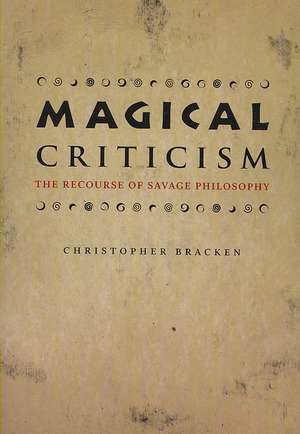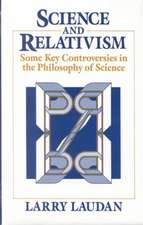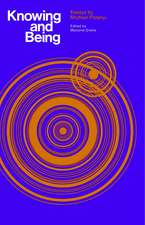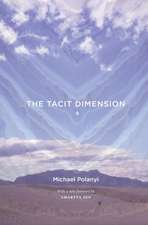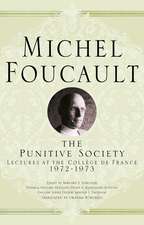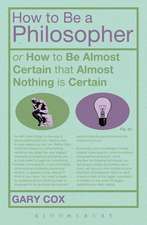Magical Criticism: The Recourse of Savage Philosophy
Autor Christopher Brackenen Limba Engleză Paperback – 15 aug 2007
During the Enlightenment, Western scholars racialized ideas, deeming knowledge based on reality superior to that based on ideality. Scholars labeled inquiries into ideality, such as animism and soul-migration, “savage philosophy,” a clear indicator of the racism motivating the distinction between the real and the ideal. In their view, the savage philosopher mistakes connections between signs for connections between real objects and believes that discourse can have physical effects—in other words, they believe in magic.
Christopher Bracken’s Magical Criticism brings the unacknowledged history of this racialization to light and shows how, even as we have rejected ethnocentric notions of “the savage,” they remain active today in everything from attacks on postmodernism to Native American land disputes. Here Bracken reveals that many of the most influential Western thinkers dabbled in savage philosophy, from Marx, Nietzsche, and Proust, to Freud, C. S. Peirce, and Walter Benjamin. For Bracken, this recourse to savage philosophy presents an opportunity to reclaim a magical criticism that can explain the very real effects created by the discourse of historians, anthropologists, philosophers, the media, and governments.
Christopher Bracken’s Magical Criticism brings the unacknowledged history of this racialization to light and shows how, even as we have rejected ethnocentric notions of “the savage,” they remain active today in everything from attacks on postmodernism to Native American land disputes. Here Bracken reveals that many of the most influential Western thinkers dabbled in savage philosophy, from Marx, Nietzsche, and Proust, to Freud, C. S. Peirce, and Walter Benjamin. For Bracken, this recourse to savage philosophy presents an opportunity to reclaim a magical criticism that can explain the very real effects created by the discourse of historians, anthropologists, philosophers, the media, and governments.
Preț: 251.70 lei
Nou
Puncte Express: 378
Preț estimativ în valută:
48.17€ • 49.76$ • 40.09£
48.17€ • 49.76$ • 40.09£
Carte tipărită la comandă
Livrare economică 25 martie-08 aprilie
Preluare comenzi: 021 569.72.76
Specificații
ISBN-13: 9780226069913
ISBN-10: 0226069915
Pagini: 256
Ilustrații: 1 line drawing
Dimensiuni: 152 x 229 x 30 mm
Greutate: 0.37 kg
Editura: University of Chicago Press
Colecția University of Chicago Press
ISBN-10: 0226069915
Pagini: 256
Ilustrații: 1 line drawing
Dimensiuni: 152 x 229 x 30 mm
Greutate: 0.37 kg
Editura: University of Chicago Press
Colecția University of Chicago Press
Notă biografică
Christopher Bracken is associate professor in the Department of English and Film Studies at the University of Alberta. He is the author of The Potlatch Papers: A Colonial Case History, also published by the University of Chicago Press.
Cuprins
Acknowledgments
Introduction: What Are Savages For?
Chapter One: Discourse Is Now
Chapter Two: The New Barbarism
Chapter Three: The Mana Type
Chapter Four: Commodity Totemism
Chapter Five: Allegories of the Sun, Specters of Excess
Coda: The Solaris Hypothesis
Notes
References
Index
Introduction: What Are Savages For?
Chapter One: Discourse Is Now
Chapter Two: The New Barbarism
Chapter Three: The Mana Type
Chapter Four: Commodity Totemism
Chapter Five: Allegories of the Sun, Specters of Excess
Coda: The Solaris Hypothesis
Notes
References
Index
Recenzii
“Christopher Bracken’s Magical Criticism is a superbly original account of the Western invention of “savage” thought. This is sharp, precise, challenging criticism of the highest order.”
“Magical Criticism boldly puts forward an erudite and entertaining argument that “discursive forces have more-than-discursive consequences.” Bracken revisits, and reinvests with significance, long-discredited anthropological concepts of “savage philosophy,” such as mana, animism, and even magic, and in the process makes the case for the contemporary relevance of nineteenth-century evolutionary anthropology—Tylor, Frazer, Lubbock—and provides stimulating new readings of classic modern discourse theory. This is an exciting, paradigm-challenging work.”
“Bracken argues that, despite our denial, savage philosophy is very much with us today, and in an extraordinary whirl through many of today’s canonized thinker, he uncovers and explicates its strands. What is quite extraordinary is the depth and breadth of Bracken’s purview—this book will appeal to scholars of literary criticism, anthropology, philosophy, and intellectual history. I was enchanted by it.”
